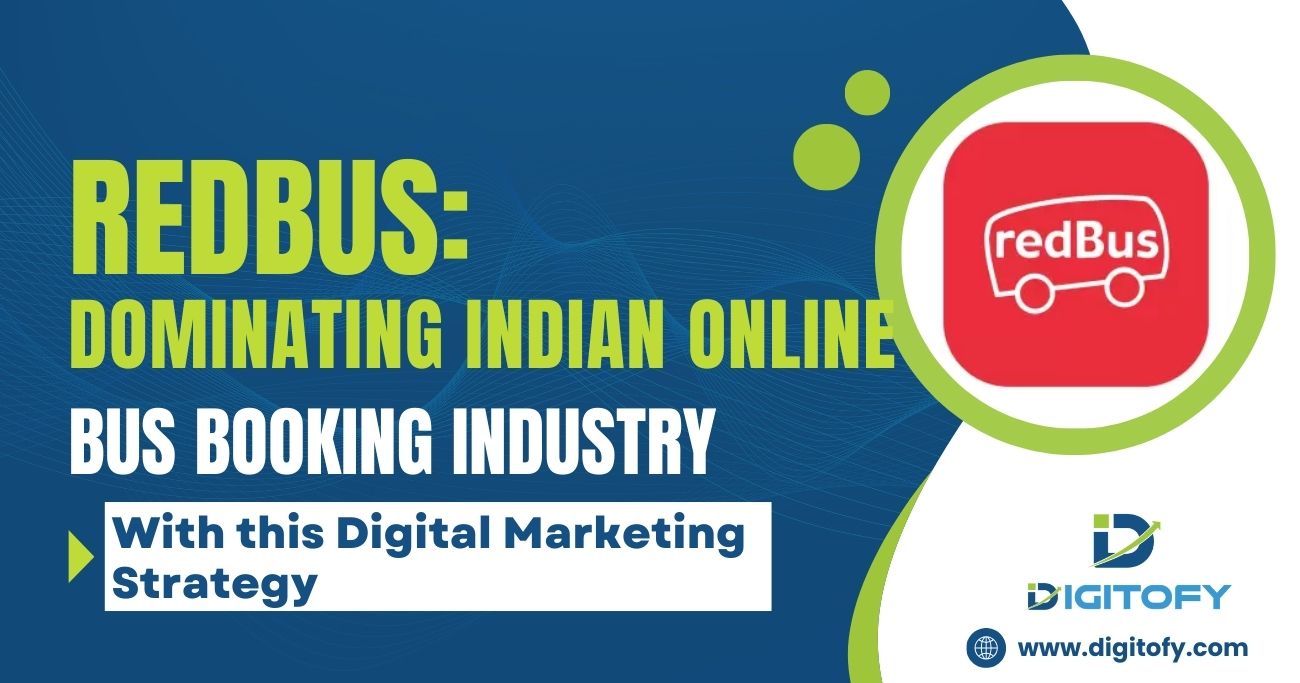How RedBus Leveraged Technology for Revolutionizing Bus Travel in India!
The advent of digital technologies and ecommerce platforms has disrupted industries ranging from retail and entertainment to transportation and travel. RedBus has been among the most prominent success stories of harnessing these digital advances to transform bus travel bookings in India. Founded in 2006 by three young engineers with a simple vision of making bus travel tickets easier to book online, RedBus has grown to become India’s largest online aggregator of bus ticketing services. It has amassed over 2500 bus operators, served over 25 million happy customers, and continues its meteoric expansion.
Also, Watch Our YouTube Shorts Video on Day 65 – Redbus: Dominating Indian Online Bus Booking Industry with this Digital Marketing Strategy
About RedBus
Bangalore-based RedBus was founded by three engineers – Phani Kumar, Sudhakar Pasupunuri, and Charan Padmaraju who had taken varied career detours before coming together to transform India’s largely fragmented and offline bus ticketing ecosystem.
After bootstrap early days, fundraising from Seedfund in 2008 provided growth boost. Today, RedBus and its over 1100 employees serve around 25 million customers across India, Singapore, Malaysia, Indonesia Peru, Columbia and Mexico. It clocks 5.5 million tickets monthly, with 3 million plus app downloads, 80% repeat users and 9 lakh plus kilometers covered daily by RedBus booked buses.
Also Read: Jio Marketing Strategy That Made Reliance Rs 900,000,000,000
What’s New with RedBus
RedBus continues to innovate and expand its services to make intercity bus travel increasingly easier. Understanding India’s evolving consumer base and their preferences is central to many new offerings – whether online or targeting smaller cities and towns.
Recent developments include:
- Launching rPool – carpooling app to provide convenient rideshare options
- Introducing RedRail for easy train bookings
- r+ Subscription for extra discounts and loyalty benefits
- Bus Hire service for group travel requirements
- Tie-ups with offline agents via RedBus WebConnect to support cash bookings
- Value+ buses for route pricing choices
- Swipe and Ride functionality via RFID cards
Constant innovation aligned to consumer needs has enabled the brand to create new avenues for sustained growth.
Also Read: Fashion on a Budget at Zudio & Their Trendiest Marketing Strategy under 999
Buyer Personas
Defining target audience archetypes that capture the key traits and behaviors of a company’s potential customers provides an invaluable base for crafting effective, persona-focused marketing programs. RedBus targets two primary persona groups:
Persona 1: Urban Tech-Savvy Traveler Demographic Profile:
- 18 to 35 years
- College students & working professionals
- Middle & upper-middle income segments
Behavioural Attributes:
- Tech-native and extensive online usage
- Seek deals, discounts & low prices
- Value convenience & customized experiences
Motivations for Using RedBus:
- Ease of booking anytime, anywhere via app/website
- Avoid offline ticket purchase hassles
- Payment innovations like e-wallets
Persona 2: Deal-Seeking Value Traveler Demographic Profile:
- 25 to 50 years
- Middle income segment
- Tier 2 & 3 cities
Behavioural Attributes:
- Aspiring segment moving from budget trains/state transports to private bus travel
- Seek affordable prices and exclusive fares
- responding to seasonal offers and price cuts
Motivations for Using RedBus:
- Comprehensive route/operator choices
- Trustworthy online booking experience
- Membership plans and cashback offers
Also Read: Fevicol Marketing Strategy : The Adhesive Industry Leader Since 1959
Marketing Mix
RedBus employs an astutely balanced marketing mix encompassing the right product, price, placement and promotion strategies for attracting and retaining target customers.
Product Strategy
RedBus app and website serve as 24×7 self-serve online sales channels for bus travel ticket bookings spanning 2000+ routes via 80,000 buses. The extensive operator network is RedBus’s core value proposition for ensuring variety and availability.
For consumers, the online experience offers:
- Comprehensive information on bus types, amenities, durations
- Seat selection with interactive listing-to-seat maps
- Accurate live tracking from pickup to drop location
- Rescheduling/cancellations under defined rules
- Multi-payment options via cards, e-wallets, EMI financing, etc.
RedBus also continues to innovate product features aligning to evolving consumer preferences – whether around new vehicle categories like sleeper and electric buses or value-adds like insurance and food bundles.
Price Strategy
RedBus leverages dynamic demand-based differential pricing allowing bus operators flexibility in fares. Consumers get transparency on route pricing choices. RedBus further employs tactical promotional pricing for off-peak demand including early bird savings, group discounts, seasonal sales with discounts as much as 50% etc. Special student prices and loyalty rewards via Subscription plans incentivize regular usage.
Tactical application of right pricing strategies target both types of core buyer personas – deal-seeking budget travelers and convenience-focused urban users. Low cost remains central to capturing mass market bus transport usage.
Place Strategy
RedBus ticketing portal is optimized for seamless access and navigation across devices – mobile, desktop/laptop, tablets. Expanding markets internationally and building offline partnerships via agents/franchises target wider metro-plus-non-metro reach across India’s broad socio-economic segments spanning Tier 1 to Tier 3 cities.
With bus routes today covering every village in India, RedBus is focused on enhancing visibility both online and offline. Tie-ups with corporates, universities support bulk bookings alongside self-serve channels.
Promotion Strategy
RedBus built its core brand strategy on the “Power of Online” for bus bookings when digital adoption in India was still nascent. It invested heavily in digital advertising and direct online customer acquisition, harnessing the potential of targeted promotions via social/search platforms.
Being among the early aggregator startups, SEO optimization, keyword targeting, social media engagement focused on cementing top-of-mind recall for online bus bookings. Referral programs, loyalty memberships further drive retention. Mainstream media campaigns during festivals, events or emergence of newer routes/operators reinforce brand presence aligning to modified consumer search behavior.
Also Read: How Tanishq Built a 3 Billion Dollar Empire with a Smart Marketing Strategy?
Competitor Analysis
Though competes broadly against all passenger transport options, RedBus’s core digital aggregator competition is: AbhiBus – Second largest after RedBus with pan-India operator network and value bus services. App and website similar to RedBus. Competes largely on price with seasonal discounts and loyalty program benefits.
- MakeMyTrip – India’s leading OTAs with significant brand equity. Moved into bus bookings including innovative sleeper bus options on popular routes. Cross-sells train and budget hotel bookings targeting end-to-end travel needs.
- Yatra – Another large OTA playing across trains, flights, hotels and highway bus options primarily for tier 1 market. Aggressive pricing and cashback promotions.
Other players like IntrCity, rBus, BusOnTicket offer limited routes catering to price-sensitive travelers. Offline unorganized bus transport sector remains the mass market competition.
Also Read: Fogg Captured 16% of Deodorant Industry’s Marketshare with this Unique Marketing Strategy
Driving Disruption through Digital Marketing
While later ventures also targeted online bus bookings, RedBus’s first mover advantage gave it commanding lead reshaping passenger transport behavior in India. Its positioning as specialist play captured share in chronically underserved yet fastest growing bus markets beyond trains and flights.
Some pioneering elements of RedBus marketing strategy that catalyzed its ascent:
Digital Adoption for Online Bus Booking
RedBus tapped early into India’s surging internet users recognizing the upside for tech-enabled, online bus ticketing when PC/mobile reach was still minimal. Aggregating supply-demand via unified platform was unprecedented for largely offline, fragmented bus operators. RedBus persisted despite initially sluggish uptake, investing in digital capabilities – website, app, payments which are their core strengths even today.
Search and Partnership Marketing
To drive discovery and scale up fast, RedBus employed search and partnership marketing intensively. With bus travel keywords search volume growing exponentially, standing among top 10 Google search advertisers ensured prime visibility and awareness. Tie-ups with payment firms like Paytm widened reach tapping partners’ existing user bases with contextual offerings.
User-First Product Experiences
RedBus built brand loyalty continually enhancing and customizing booking experiences aligning to user expectations. Segment-targeted features, regional language versions, personalized promotions serve diverse visitors across use frequencies and travel needs. Uncompromising user focus established credibility.
Trust and Reliability Messaging
RedBus communication has focused extensively on reinforcing reliability, safety, accessibility for bus travel via aggregation. Targeting first-time online ticket buyers hesitant to switch from offline, the brand has leveraged regional media partnerships combined with vernacular ads on digital mediums. Customer testimonials as endorsement play up reliability and superior assistance aspects.
Also Read: Paytm’s Paisa Vasool Journey: Crafting a Winning Marketing Strategy
Conclusive words
Through harnessing technology and digital innovation to transform fragmented bus travel, RedBus has demonstrably enhanced discovery, access, affordability and convenience for millions. Its sustained market dominance stems from customer-centricity and continually adapting to evolving consumer preferences while bolstering reliability and trust.
Related Post:
How Chayoos Captured Gen Z’s Gen Y’s Audience with This Simple Marketing Strategy
Dominos: How Their One Marketing Strategy Made Them the Largest Pizza Company in India
Disrupting the Hotel Industry: How OYO Rooms Took Marketing by Storm
Inside Shaadi.com – The Incredible Marketing Strategies Behind Their Success
Octave: From Ludhiana to a 250 Cr Brand – How They Captured the Youth Attention
Inside the Marketing Strategy of Billion-Dollar Company Asian Paints

.webp)

